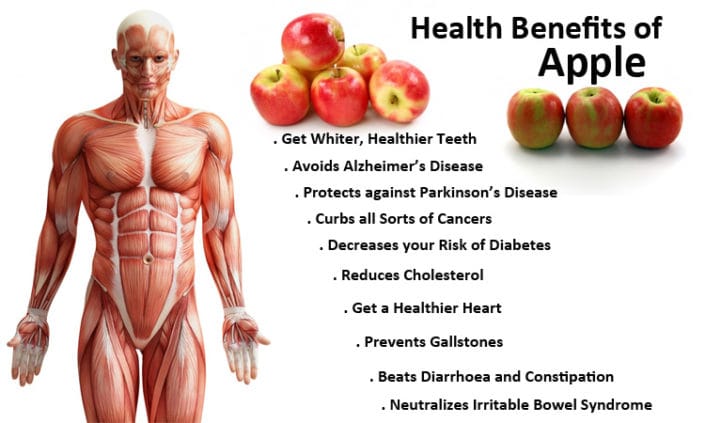
An apple a day keeps the doctor away — a saying rooted in truth! Apples are not just sweet and refreshing, but they’re also packed with nutrients that promote overall well-being. From heart health to digestion and weight loss, this humble fruit does wonders for your body.
In this article, let’s explore the science-backed health benefits of eating apples, nutritional facts, and why they should be a regular part of your diet.
Nutritional Profile of an Apple (Medium-Sized, ~200g)
- Calories: ~95
- Carbohydrates: 25g
- Dietary Fiber: 4g
- Sugars: 19g (natural sugars)
- Vitamin C: 14% of the RDI
- Potassium: 6% of the RDI
- Vitamin K: 5% of the RDI
- Antioxidants: Quercetin, catechin, chlorogenic acid
✅ 1. Supports Heart Health
Apples are rich in soluble fiber, especially pectin, which helps reduce bad cholesterol (LDL) levels.
How it helps:
- Lowers blood pressure
- Improves artery function
- Reduces inflammation
🩺 Study Insight: Regular apple consumption has been associated with a lower risk of stroke and heart disease.
✅ 2. Aids in Weight Loss
Apples are high in water and fiber, which increase satiety and reduce hunger cravings.
Why it works:
- Eating an apple before meals can reduce overall calorie intake
- Low in calories but high in volume — perfect for snacking
💡 Pro Tip: Eat whole apples instead of drinking juice to feel fuller and get maximum fiber.
✅ 3. Improves Gut Health
Apples contain prebiotic fiber that nourishes the good bacteria in your gut.
Benefits:
- Supports healthy digestion
- Prevents constipation
- Promotes a balanced gut microbiome
🦠 Did You Know? A healthier gut can lead to stronger immunity and even improved mental health.
✅ 4. Regulates Blood Sugar
The polyphenols in apples can slow down carbohydrate digestion and help maintain blood sugar levels.
How it helps:
- Improves insulin sensitivity
- Ideal for diabetics when eaten in moderation
📊 Glycemic Index: Apples have a low GI, meaning they release sugar slowly into the bloodstream.
✅ 5. Boosts Immunity
Apples are rich in Vitamin C and antioxidants like quercetin that enhance immune function.
What it does:
- Protects cells from damage
- Fights infections
- Reduces the risk of chronic illnesses
🛡️ A strong immune system is your best defense against colds, flu, and more serious diseases.
✅ 6. Supports Brain Health
Antioxidants found in apples may protect the brain from oxidative stress and age-related decline.
🧠 Brain Benefits:
- Improves memory
- Protects against neurodegenerative diseases like Alzheimer’s
- Enhances focus and mood
🍏 Fun Fact: The skin of apples contains most of the beneficial antioxidants — don’t peel it off!
✅ 7. Promotes Healthy Teeth
Biting and chewing apples stimulate saliva production, reducing the risk of tooth decay.
Dental Perks:
- Cleanses the mouth
- Freshens breath
- Strengthens gums
🪥 While apples are no substitute for brushing, they’re a great post-meal fruit for oral health.
✅ 8. Reduces Risk of Certain Cancers
Some compounds in apples, like phytochemicals and flavonoids, have been linked to lower risks of:
- Colorectal cancer
- Lung cancer
- Breast cancer
🍎 Study Highlight: Apple peels contain triterpenoids, compounds that show anti-cancer properties in lab studies.
Best Ways to Eat Apples
- Raw as a snack (with skin)
- In oatmeal or salads
- Baked with cinnamon for dessert
- Sliced with peanut butter
- In smoothies or detox drinks
⚠️ Caution: Who Should Limit Apple Intake?
- People with IBS or sensitive stomachs may react to the high fructose content.
- Individuals with allergies to raw fruits (especially in pollen seasons).
📌 Always wash apples thoroughly or choose organic to avoid pesticide exposure.
Final Thoughts
Apples are nutritional powerhouses — tasty, filling, and incredibly good for your body. Whether you’re trying to lose weight, improve your gut health, strengthen your heart, or just snack smarter, apples are an excellent choice.
“Eat an apple a day — and give your health a fresh start, every day!”





